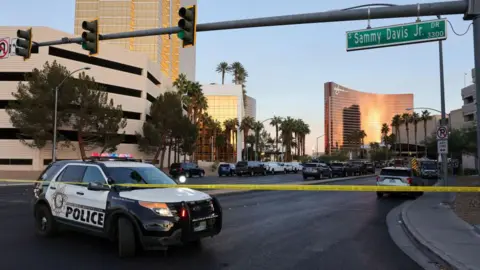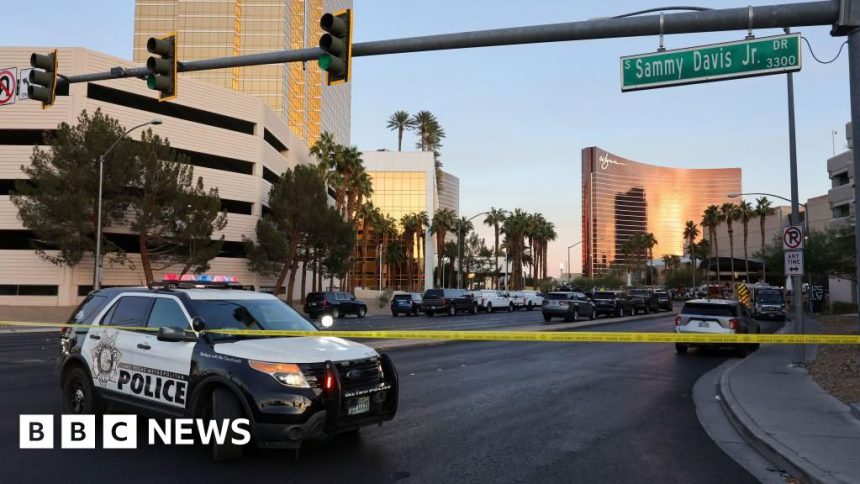Unanswered questions remain after Las Vegas vehicle explosion
US law enforcement is looking for clues to unravel the mystery behind the Tesla vehicle that exploded outside Trump International Hotel in Las Vegas earlier this week, giving seven people minor injuries.
The man who rented the Cybertruck – then drove it to the city and parked it in front of the hotel – has been identified as Matthew Alan Livelsberger, a 37-year-old active-duty US special forces soldier.
Police found his lifeless body inside the charred Tesla with a self-inflicted gunshot wound. They also found fuel cannisters and more than a dozen firework mortars in the bed of the vehicle.
On Thursday, there remained a heightened police presence at the hotel, located right off the busy Las Vegas strip. Yellow police tape cordoned off a small section of the hotel’s entrance as employees worked to repair damage to the facade.
Authorities continue to work and piece together information, and many questions remain.
For example, it is unclear why Livelsberger rented the car – or if the perpetrator was intending to make a political statement ahead of Donald Trump’s return to the White House later this month.
Why did Livelsberger drive to Las Vegas?
 Getty Images
Getty ImagesOne of the biggest unanswered questions is why Livelsberger rented the Tesla and drove it more than 800 miles (1,300km) from Colorado to Las Vegas.
Las Vegas police said he rented the vehicle on 28 December in Denver. They were able to track his movements using photographs taken on the drive and information from Tesla’s charging technology. He was the only one seen driving it, they said.
The vehicle arrived in the city on Wednesday morning, less than two hours before the explosion, police said.
Las Vegas Sheriff Kevin McMahill said on Thursday that a body inside the vehicle was recovered. It was burned beyond recognition, but the county’s coroner used DNA and dental records to confirm that Livelsberger had been inside the Cybertruck at the time of the blast. He was found with a self-inflicted gunshot wound to the head.
“I’m comfortable calling it a suicide with a bombing that occurred immediately after,” Sheriff McMahill said. He added that no motive for the incident had been established.
Was the explosion meant to be a political statement?
Another big question is whether the explosion was meant as a statement ahead of the change of US president later this month.
Police have not found any evidence that links the alleged perpetrator to specific political beliefs, but they said they were investigating whether the incident was tied to the fact that President-elect Donald Trump owns the hotel, or that Elon Musk runs Tesla.
Trump recently named Musk to co-lead a presidential advisory commission, the Department of Government Efficiency, after the two became close during Trump’s campaign.
“It’s not lost on us that it’s in front of the Trump building, and that it’s a Tesla vehicle,” said Spencer Evans, an FBI agent based in Las Vegas, on Thursday.
“But we don’t have information at this point that definitely tells us, or suggests, that (the incident) was because of a particular ideology,” he said.
Was it related to the attack in New Orleans?
The explosion happened just a few hours after a man drove a pickup truck into New Year revellers on the crowded Bourbon Street in New Orleans, Louisiana, killing 14 people and injuring dozens of others.
That attacker has been identified as Shamsud-Din Jabbar, a 42-year-old US citizen who also served in the US Army.
President Joe Biden has said investigators are looking into whether the two incidents are linked, though so far nothing has been uncovered to suggest that is the case.
But the question continues to be fuelled by the apparent similarities between the two incidents and some biographical details of the drivers of both vehicles.
Both incidents happened in the early hours of New Year’s Day. Both men served in the US armed forces – including at the Fort Liberty (formerly Fort Bragg) military base in North Carolina – and both completed a tour in Afghanistan. Both men also rented the vehicles they used through a mobile car rental application called Turo.
However, police have said there is no evidence the two men were in the same unit or served at the same time at Fort Liberty. Although both were deployed to Afghanistan in 2009, there is no evidence they served in the same province, location or unit.
In the New Orleans attack, police recovered an Islamic State (IS) group flag from the vehicle used by Jabbar. They added that he posted videos to social media moments prior claiming allegiance to the group. Police have determined that Jabbar was acting alone.
Meanwhile, in Las Vegas, there is no evidence that suggests that Livelsberger was motivated by IS, or that he and Jabbar had ever been in contact. Police have cautioned that the investigation remains active.
What is Livelsberger’s background?
Livelsberger was a decorated special forces intelligence sergeant who was serving in Germany, but was on approved leave at the time of the incident.
His father told BBC’s US partner CBS News that his son was in Colorado to see his wife and eight-month-old daughter.
He said he last spoke to his son at Christmas and that everything seemed normal.
The Daily Beast reported that Livelsberger was a “big” supporter of Trump. A senior law enforcement official who spoke with Livelsberger’s family told the outlet that Livelsberger voted for Trump in November’s election.
His uncle told The Independent that Livelsberger loved Trump “and he was always a very, very patriotic soldier, a patriotic American.”





